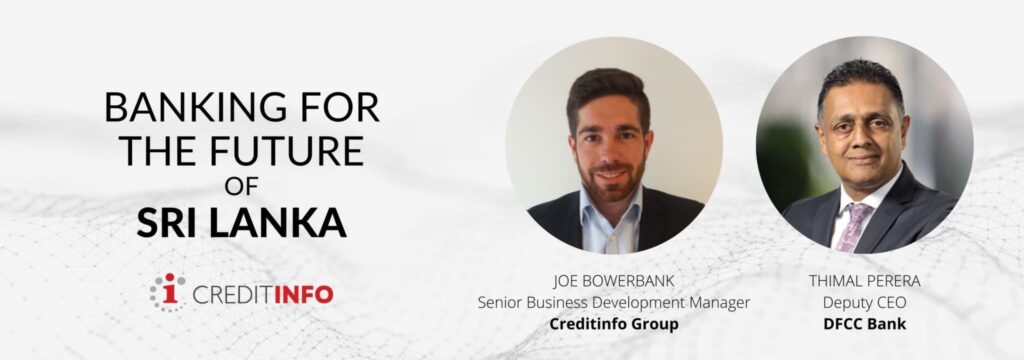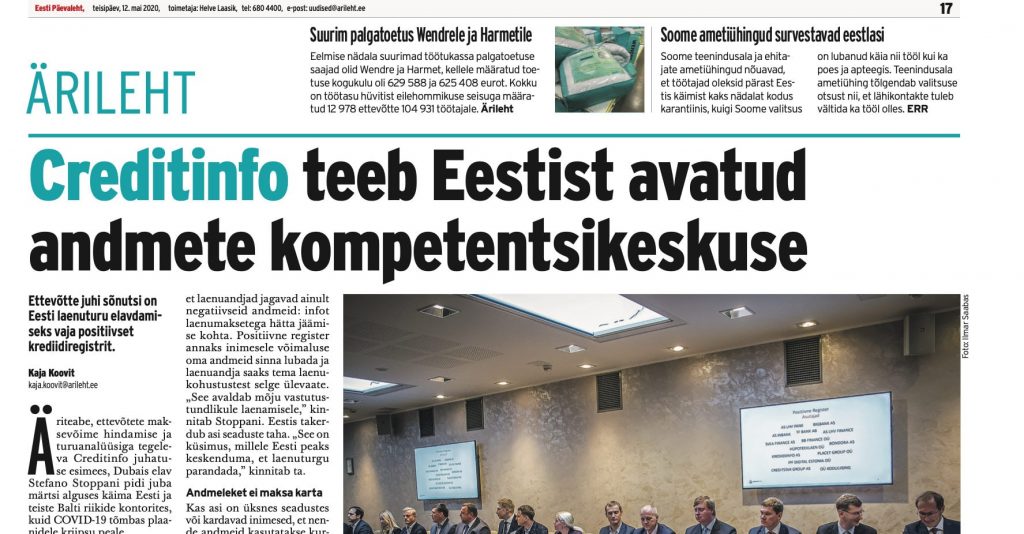Banking for the future of Sri Lanka

Interview with Thimal Perera – Deputy CEO, DFCC Bank
Our Senior Business Development Manager, Joe Bowerbank, caught up with Thimal Perera, Deputy CEO of DFCC Bank. Thimal provided a number of interesting insights into how DFCC is strategically dealing with the challenges of operating in 2020 and building a roadmap to continue delivering a first-class banking experience going forward. Thimal has worked in both local and international banks across the globe, looking after a number of different areas from SME and retail, to digital transformation amongst others. This interview focuses on digitalization and credit risk – two areas that have been hot topics for Creditinfo’s clients this year.
Phone model, mobile internet and missed calls might determine whether you get credit

Press Release
Ever more personal data will in the future determine whether people can get a loan or buy goods on installment. If a person consents, before a decision is made about granting them credit they may be asked for permission to examine not just repayment of past loans but also other private information: what model of phone they have, whether they actively use mobile internet, whether they often do not answer calls. It may even be suggested that they play a real-time game whose outcome will determine whether they as a customer are creditworthy.
While companies that give credit have typically relied only on information gathered by financial institutions, now more and more personal data will influence decision-making. Whether credit is granted, how much, and on what terms may depend on whether a customer is ready to share that information.
“There’s no doubt that personal data can only be used with the person’s consent,” Creditinfo Head of Decision Analytics for the Baltic states, Maxim Fetisov immediately stresses. “But practice shows that openly sharing additional information increases a creditor’s trust, lets them more accurately assess each customer’s trustworthiness, and even allows customers to expect more favorable credit terms.” Research conducted by Creditinfo has shown that knowledge about a customer’s personal habits gives creditors just as many insights as formal data.
A recent conference “Scoring Kitchen” by Creditinfo, which rates the creditworthiness of companies and individuals in more than 50 countries, addressed what is new in the scoring process. For example, a study was done together with telco company on how people’s financial reliability relates to their everyday behaviour. Analysis of the data revealed that even how long people use one telecom operator’s services shows which ones are financially more trustworthy: the longer someone uses the same telco’s services, the more financially reliable their loan-payment history is too. And on the contrary, customers who frequently change operators generally demonstrated a higher level of riskiness.
Those without 4G and who use mobile internet little fall into a higher-risk group
Creditinfo analyst Allan Anyona, who took part in the study, also notes that individuals who are less financially reliable tend to have more modest internet plans and rush to connect as quickly as possible to free Wi-Fi networks at home and elsewhere.
Moreover, it was observed that the more advanced the network connection a potential customer’s phone supports, the greater their creditworthiness. So customers using phones that support 4G network requirements are seen more favorably than those whose phones only work on a 2G network or do not make such information available.
Many missed calls points to a frequent debtor
Creditors get useful insights as well from data about whether a potential customer often fails to answer incoming calls. People were divided into five categories: those who fail to answer calls very often, often, an average amount, rarely, and very rarely. It turns out the most financially reliable were those in the last two groups. The riskiest customers, meanwhile, were among the people who “miss” calls more often than others.
“We assume that people experiencing financial difficulties avoid answering calls as they do not want to talk with creditors or with relatives to whom they may also be in debt,” the Creditinfo Group analyst explains.
With smart devices revealing more and more information about consumers, creditors are eager to actively look at other habits too – like the use of a mobile wallet. The more punctually a customer tops up their mobile wallet limit and the bigger their income, the higher their credit rating will be. Conversely, the smaller someone’s income is and the longer they use credit provided by a telco, the more cautiously other lenders will view them. So those people should not be surprised if they are not allowed to buy a more expensive item on installment or are refused a bigger credit limit on a payment card.
Games show how you will behave with real money
Seeking to get a more objective assessment of a customer’s creditworthiness and to automate the decision-making process, psychometric data are being used ever more actively. A future customer may be asked to play a quiz that takes 5-7 minutes. It may be a series of questions, like: how would you use an unexpected gift of €200 – would you spend it on entertainment or save it? Studies show that the customers who meet their financial obligations most responsibly tend to choose the answer ‘I would save it’ in the game, while the riskiest customers more often choose ‘I would spend it on entertainment’.
“We realize that over time skilled players learn to choose those answer that creditors view more favorably. But in calculating any individual’s rating, dozens of other factors are also assessed, like their insurance history, repayment of earlier loans, payment of utilities bills, and so on,” CEO of Creditinfo Lithuania, Aurimas Kačinskas notes.
The pandemic also altered how companies are rated – there are new factors
The CEO of Creditinfo Lithuania says the challenges of the pandemic in 2020 are also changing the rules for rating businesses. New factors have arisen that impact credit scores. For instance, a new indicator for the impact of Covid-19 has altered the current ratings of companies all over the world. It shows how the coronavirus pandemic has impacted every area of business (e.g., tourism, hotels, manufacturing, transport, etc.) and how companies’ creditworthiness relates to the geographic location of their operations, demand for the goods they produce, and possibilities for quickly recovering after restrictions and quarantine end. Businesses’ ratings are also heavily influenced by a ‘Collection’ indicator that reflects whether a company punctually settles with its creditors.
“We have no doubt that the new factors that are coming up will have an increasing significance for companies’ credit scores – in a time of economic turmoil, it’s very important for creditors to objectively assess every customer’s riskiness and make the most accurate decisions possible,” Maxim Fetisov, Head of Decision Analytics in the Baltics says.
-ENDS-
About Creditinfo
Established in 1997 and headquartered in Reykjavík, Iceland, Creditinfo is a provider of credit information and risk management solutions worldwide. As one of the fastest growing companies in its field, Creditinfo facilitates access to finance, through intelligent information, software and analytics solutions.
With more than 33 credit bureaus running today, Creditinfo has the largest global presence in the field of credit bureau and risk management, with a significantly greater footprint than competitors. For decades it has provided business information, risk management and credit bureau solutions to some of the largest, lenders, governments and central banks globally – all with the aim of increasing financial inclusion and generating economic growth by allowing credit access for SMEs and individuals.
For more information:
Media Contacts:
Caterina Ponsicchi,
Marketing Director, Creditinfo Group
Mala’a launches Credit Bureau System in Oman

Creditinfo and Mala’a’s strategic partnership started in January 2019 and since then, the teams have been developing a state of the art Credit Bureau System, connecting members, integrating with new data providers, and ensuring the system is protected to the highest security standards.
On November 18th 2020, Mala’a officially launched its state-of-the-art Credit Bureau System to the banking sector in Oman. This announcement affirms Creditinfo’s commitment in helping businesses globally make better use of information and data, along with providing the latest software solutions to enhance risk decisioning strategies. Creditinfo have over the years strengthened our partnerships with Credit Bureaus globally by delivering Creditinfo’s technology with core credit bureau systems, infrastructure expertise, operational set up, self-service platforms, alternative data, digital lending solutions among other tailored services.
Creditinfo will continue partnering with Mala’a into the next phase of our project. The teams will be ensuring we expand the membership to new sectors such as telecommunication and insurance and delivering new value-added services like Instant Decision Solutions, Mobile Lending Platforms and Portfolio Management tools. This will help lenders and organizations improve the application process and the customer experience for Oman residents.
Lenders across the GCC are changing the way in which they operate and make decisions on an individual’s creditworthiness moving to a digital based approach while harnessing traditional and non-traditional data. With Creditinfo Gulf based in Muscat now firmly installed in the region Creditinfo will remain at the forefront of facilitating access to finance in each of our markets and help lenders to reduce risk and increase profitability. We look forward to continuing assisting with cutting-edge technology in the region and helping Lenders and Telcos increase profitability without increasing the risk of new business.
Gary Brown, MD, Creditinfo Gulf.
Creditinfo West Africa Hits 20 Million Contracts

Creditinfo West Africa today marked a major milestone by hitting the 20 million contracts threshold and growing, in the regional Credit Information Bureau (BIC) making it a historic day for Creditinfo West Africa, the entire UEMOA region and Creditinfo Group.
Players in Baltic Markets (Latvia, Estonia) and Iceland Measure Risk better, benefitting from Covid-19 Impact Score Developed by Creditinfo.

Credit providers need to understand how COVID crisis affected their counter-parties and customers in order to better manage risk exposure and reduce losses. Current scoring models are unable to fully answer these needs as they were developed on pre-crisis data and need time to adjust to new conditions.
The way leading to the ‘haven’ of Startups is grounded by Data Analysis

Lithuania‘s transformation to the startup-friendly country has been successful: last year the first “unicorn” appeared in the market, and the startup ecosystem at present includes over 900 enterprises which have the great potential for business development based on innovations. And yet, the general conception of the startups’ contribution to the country’s economy has remained stereotypical, as it is alleged that these are risky enterprises which rapidly emerge and dissolve, and that they create few workplaces. The latest analyses done by “Creditinfo” and “Startup Lithuania” reject these stereotypes.
Thanks to Creditinfo, Estonia becomes the competence center of open banking

The Head of the company says a positive credit register is needed for boosting the Estonian credit market. Stefano Stoppani, Dubai-based Chairman of the Board of Creditinfo providing business information, solvency assessment and market analysis, intended to visit its offices in Estonia and the other Baltic countries in the beginning of March, but COVID-19 hampered with these plans. Europe is cautious in regulating both data protection and open banking. The aim of the PSD2 directive is to give third parties – licensed companies – access to a person’s bank account information. This is not done just because, but for providing better service, and obviously the account holder must authorize this. The third-party, for example, the creditor, can then see the income of the person and what the money is spent on. Information is needed to determine if the person is able to pay back the loan (s)he wants.
Keep an eye on Partners’ Payments, Lithuanian experts advise

The current situation in Lithuania compels businesses to regard its partners with a deeper mistrust. The enterprises face challenges of their survival – how to ensure the continuity of activities, reorientate its services, and not lose the clients. Even those businesses which have a sufficient number of clients, feel worried about whether their partners are still trustworthy and will make payments on time.
Digitalization Helps Lenders Overcome Challenges Caused By COVID-19

The rapid spread of the Coronavirus is impacting economic growth and market volatility is increasing thus impacting the industry through weakening investment returns and potentially adverse impact on the capital position of financial institutions around the world. A sustained economic slowdown triggered by the outbreak will put negative pressure on revenues and lead to a material increase in credit risk and a potential spike in claims including for health, credit and event cancellation insurance.
Never Has There Been Stronger Evidence for Mobile Loans in West African Economic and Monetary Union region

With many countries in the West African Economic and Monetary Union (WAEMU) region in lockdown, bank branches empty and movement constrained; the case for a true, robust mobile lending ecosystem is stronger than ever. In global markets where mobile lending is nascent or inexistent, and the credit market is relegated to physical interaction between underwriter and customer, physical confinement and countrywide lockdowns are the equivalent of death sentences. Credit markets are frozen because critical communication is impossible. On the other hand, where digital wallets and e-money are common, no such barriers exist.




